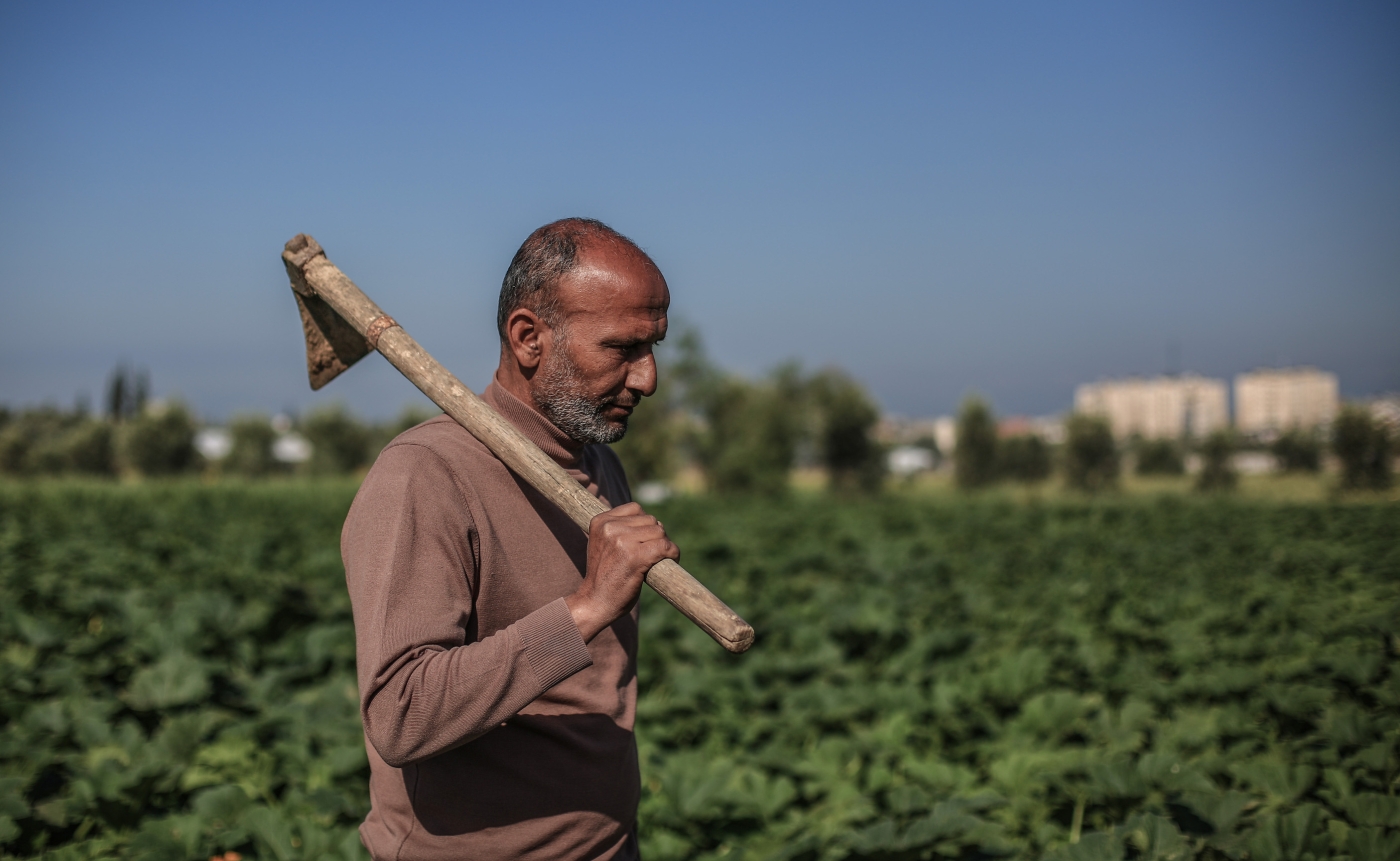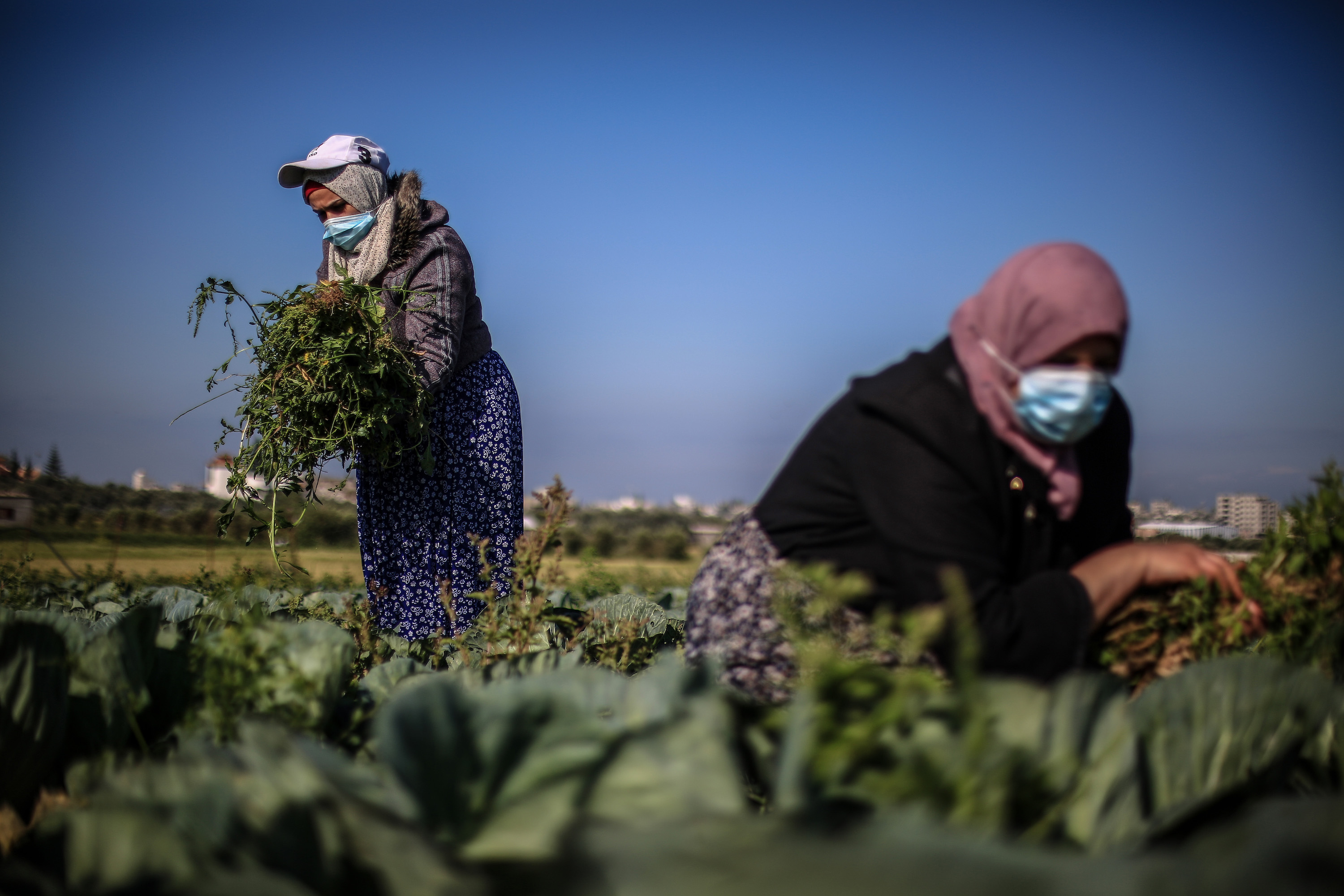Palestinian farmers say they face constant threats while working on family lands due to Israel’s annexation policies

By Maha Hussaini in Gaza Strip
Published date: 30 March 2021 12:22 UTC
On 30 March 1976, six Palestinians were killed by Israeli forces as hundreds of Arab citizens in the occupied territory took to the streets to protest Israel’s expropriation and occupation of Palestinian lands.
The event became known as the Land Day and a symbol of national struggle that unites Palestinians around the world.
Forty-five years later, Palestinians say that not much has changed, as Israel continues its policy of annexation.
Middle East Eye met with Palestinian farmers and land owners in the Gaza Strip, who have been unable to access hundreds of dunums of land belonging to their families due to Israel’s restrictions and annexation policy.
Land theft normalised
Iyad Abughleiba, 49, a Palestinian who owns agricultural land in the eastern central Gaza Strip, says that farmers find it increasingly difficult to work in the blockaded enclave as Israel continues to “normalise land theft”.
Since age 15, he and his brothers would help their father cultivate the family lands. When his father passed away, the siblings inherited the lands and continued to work as farmers.
“My grandfather had owned more than 400 dunums of land. But over the years, and with every Israeli decision or new policy, the lands have been gradually shrinking. Today we only have 25 dunums left,” Abughleiba told MEE.
‘Our safety depends on the Israeli soldiers’ mood. You could be killed at any moment’
– Iyad Abughleiba, Palestinian farmer
Although Israel dismantled its settlements in Gaza in 2005 and withdrew its forces and settlers from the enclave, it still controls vast areas of land in the northern and eastern perimeter of the Strip.
“Israel’s disengagement from the Gaza Strip is the biggest lie. They are controlling every inch of the Strip – the land, the sea, and can you hear that noise? They are also controlling the air,” Abughleiba said as an Israeli drone buzzed at low altitude above his land.
“Like the majority of Palestinians, our grandparents lost most of their lands in Gaza and the West Bank during the [Palestinian] Nakba. But land theft did not stop here.”
The Nakba, meaning the “disaster, catastrophe or cataclysm”, marks the partition of Mandatory Palestine in 1948 and the creation of Israel. At least 750,000 Palestinians were displaced from their homes that year. A further 280,000 to 325,000 fled their homes in territories captured by Israel in 1967.
Following its disengagement from the Gaza Strip in 2005, Israel established a “buffer-zone”, a military no-go area that stretches across the Strip’s borders with Israel. The first reference to a buffer-zone in the Strip appeared in the Oslo Accords in 1993, which mentioned a 50-metre wide area along the enclave.
Today, it extends to more than 300 – 2,000 metres inside the Strip.What is the Nakba? Day of catastrophe for Palestinians, explainedRead More »
“When Israel first established the buffer zone, we lost part of our lands. Then when they expanded it in 2009, we lost another part. This is how they gradually annex more parts of our lands every now and then,” Abughleiba explained.
Abughleiba is always on high alert while farming, even though it’s been a couple of years since Israel last annexed parts of his family’s lands.
“Even if the rest of our lands is still accessible, we are always cautious due to threats of crops being bulldozed or shots being fired at us whenever we are working.
“In 2008, the Israeli forces bulldozed our lands, uprooting dozens of olive trees and destroying a water well. In 2014, during the war on Gaza, they did it once again,” he said.
Gaza farmers and landowners bear the brunt of Israel’s policies, facing periodic bulldozing of lands, flooding of crops, and shooting by Israeli forces stationed adjacent to their lands.
“After they bulldozed our lands, we planted them again and still insist on coming back to them because they are our only source of living.
“But after all, our safety depends on the Israeli soldiers’ mood. You could be killed at any moment.” Abughleiba told MEE.
‘Modernised’ methods to steal land
Um-Emad is a Bedouin woman who was expelled from her family’s land in Beersheba during the Palestinian Nakba in 1948.
The 79-year-old lives in a small room in her sons’ house, built in the middle of their agricultural land in the eastern Bureij, in the central Gaza Strip.
For Um-Emad, living on agricultural lands is part of her family’s heritage.
‘I can never imagine my life away from our land. One metre of this land is worth a thousand apartments elsewhere.’
– Um-Emad, 79, Gaza resident
“I can never imagine my life away from our land. One metre of this land is worth a thousand apartments elsewhere,” she told MEE as she sat on the ground of her room overlooking the fields.
“If I have to leave my land in Gaza, then it has to be to my family’s land in Beersheba. That is the only place I can leave to before I die.”
Um-Emad, who was evicted to Gaza at gunpoint when she was six years old during the Nakba, thinks that Israel intends to make Palestinians pay a high price for sticking to their lands, while facilitating their migration from the Gaza Strip and the West Bank.
For years, Israel has been implementing an annexation plan in the West Bank that was accelerated following the announcement of former US president Donald Trump’s “deal of the century”, in January 2020.
As a result, dozens of families across the West Bank and East Jerusalem have been evicted and displaced.
According to rights groups, Israel’s annexation of Palestinian lands constitutes a flagrant violation of international law, and “can have no effect on the legal status of the territory, which remains de jure occupied”.

“Israel today implements a systematic policy of forcing Palestinian residents in the Gaza Strip and the West Bank to migrate and leave their lands.
“The occupation does this both softly and by force. They make Palestinians believe that living in Europe with better life standards is a dream, and thus make thousands of youth leave in search for a better life, in order to make room for [Israeli] settlers.
“We are being forced to abandon our lands, but I would rather be buried here before selling one centimetre of my family’s land,” he said.
‘Every day is Land Day’
Jalal Abujlala, 47, depends mainly on his agricultural land in the eastern central Gaza Strip for living.
But with the remaining area of land after annexation by the buffer zone, the father of eight children can barely cover his family’s expenses, which include the tuition fees for his daughter who’s attending university to study medicine.
‘I always tell (my children) about our stolen lands, and that one day we will regain them back’
– Jalal Abujlala, 47, Gaza farmer
“A large part of our lands was annexed by the Occupation during the Palestinian Nakba and also due to the establishment of the Israeli buffer zone. Now the remaining area can only provide the life’s necessities,” said Abjlala.
“I can see my family’s annexed lands in the occupied territory from here. Sometimes, I approach a bit and take my children to see them. I always tell them about our stolen lands, and that one day we will regain them back,” he said.
“You would think that cultivating in this land is safe since it is not very close to the Israeli borders. But in fact, it does not have to be close in order for the farmers to be hurt,” he continued, recalling memories from Israel’s military attack on Gaza in 2014, where artillery shells targeted vast areas of agricultural lands.
“Owning a land in our country comes with no guarantees. At any moment you are threatened with bulldozing or eviction and annexation.”
For Abujlala, Israel’s measures in the Gaza Strip and the West Bank are similar to the event that sparked the Land Day demonstrations in 1976.
“History repeats itself. The Land Day happens everyday in Palestine.”












No comments:
Post a Comment